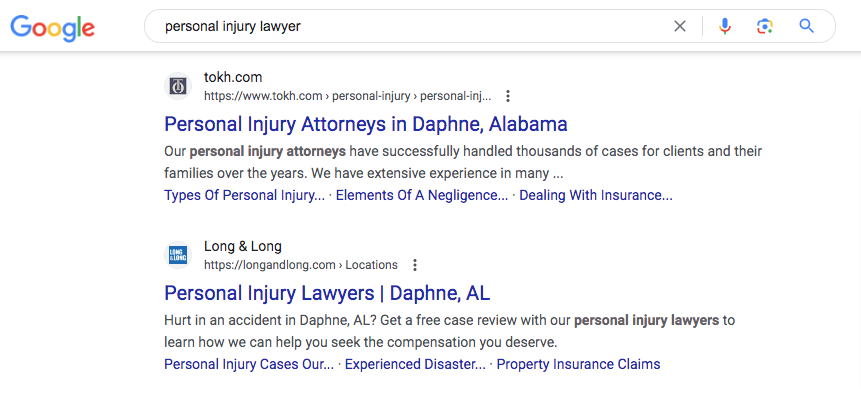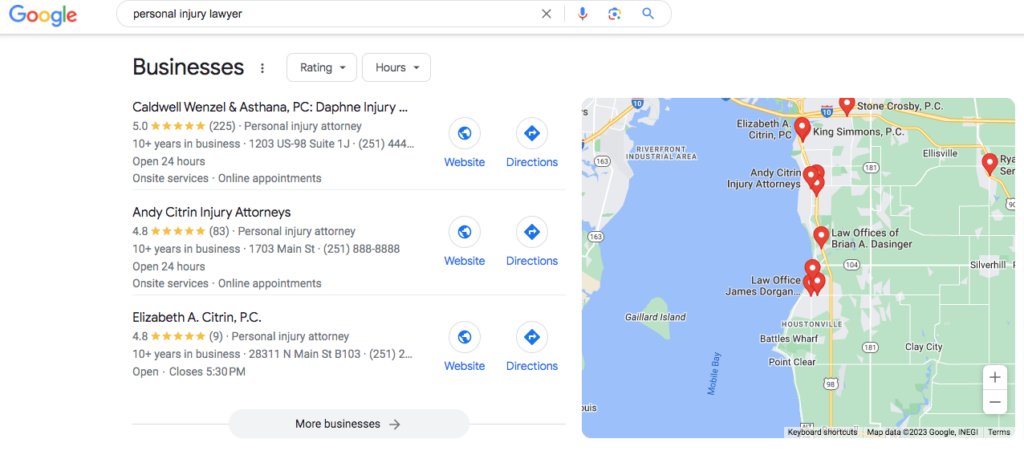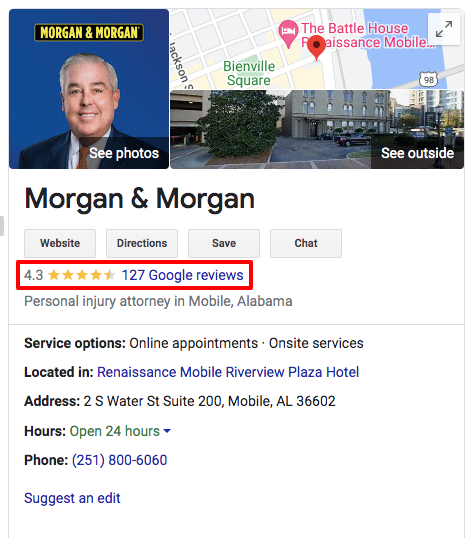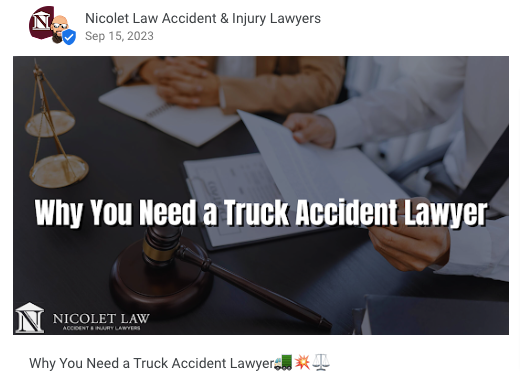As a personal injury attorney, you’re an important part of your community. Your clients certainly see you that way.
But does Google?
Just check your local rankings to find out. If they’re not what you want or expect, you probably need to start convincing Google that you ARE an important part of your local community.
You know what that’s called? Local SEO.
Some people call it “Google Maps SEO” or “Google Business Profile SEO” — but, for injury lawyers, it’s just local SEO.
Because you are local. And you NEED SEO to stand out from your other (local) competitors.
I’m going to show you how to do that. Here’s everything you need to know about local SEO for injury law firms.
What Are Local Rankings for Law Firms?
Local rankings look a couple of different ways for law firms.
First, you have the standard organic local rankings. Just Google “personal injury lawyer” and you’ll see a localized version of this:

But you probably noticed something as you were scrolling to the organic results shown in the screenshot above: the Google Maps results.

That’s the second part of local rankings.
And yes, you CAN manipulate where you show up in Google Maps when someone Googles “injury lawyer near me” or tells Siri to find them an injury attorney that offers free consultations.
The Importance of Local SEO for Injury Firms
Where you rank, locally, as an injury attorney MATTERS. A lot.
Some people will look exclusively on Google Maps as they search for local businesses like your law firm.
Others will use traditional Google results. And the No. 1 ranking result will get 10 times the clicks as the No. 10 result at the bottom of the first page of results.
And still others will simply compile a list of injury law firms and Google each one by name. Then, they’ll look at the Google Business Profile for each, paying special attention to the reviews.

That’s all a part of local SEO for injury attorneys. It’s how most injury firms get most of their clients online.
How Google Ranks Law Firms Locally
If you poke around on this site, you’ll see I talk a lot about how Google works. But most of that doesn’t apply here.
That’s because Google has a different process for ranking businesses LOCALLY than it does nationally.
Don’t worry — I’m going to fill you in on how it works.
Basically, Google focuses on three broad factors when determining local rankings for personal injury firms:
- Distance
- Relevance
- Prominence
Let’s look closely at each factor:
Distance
Distance here refers to physical distance. Google usually knows where searchers are located. And businesses.
Leaving the creepiness of that aside, let’s talk about what it means for your firm:
If you’re a personal injury lawyer with a single office in Austin, Texas, you have a shot at ranking well for the following Google searches based on this one factor:
- Austin personal injury attorney
- Personal injury lawyer (searched by someone located in Austin)
If someone in Des Moines, Iowa, searches for “personal injury lawyer,” however, you’re not likely to rank for that search.
But what about someone in Round Rock, Texas, just a short drive from Austin? If they search for “personal injury lawyer,” you’re more likely to rank than a firm in New Orleans. But less likely to rank than a firm with an office location in Round Rock proper.
Starting to make sense? Google’s thinking here is that local searches warrant local results.
And while the search engine IS sophisticated, it’s not yet sophisticated that you may be the better result to serve because you’ll happily serve Round Rock clients (and provide better legal services than your competitors with offices there).
Relevance
As it relates to local SEO, relevance is all about matching keywords (or the meaning behind keywords).
What I mean is this: You, as our fictional Austin personal injury lawyer, stand no chance of ranking for “Thai restaurant Austin.”
Of course, you wouldn’t want to. But this concept starts to matter more when you zoom in.
What if your website, Google Business Profile (GPB), social profiles, directories, reviews — everything — simply say you’re an “attorney” without ever specifying that you do personal injury?
Well, you’re less likely than your competitor, who clearly states that they’re an injury attorney, to rank well when someone Googles “Austin personal injury lawyer.”
But how do you demonstrate relevance? I can answer that in one simple word:
Everywhere.
Here’s what I mean by that:
You need to state on every property you own or control online that you are a (insert city here) personal injury lawyer.
That means your website, your blog posts, your landing pages, your directory profiles, your GBP, your social media accounts. And more.
Prominence
So far, we’ve covered that you need distance and relevance in order to rank well locally. So, then, how does Google decide which order to rank all the Austin personal injury lawyers who have offices in Austin and state clearly (everywhere) that they are Austin personal injury lawyers?
With prominence, the murkiest of all the local SEO ranking factors.
Google has never made it clear what, exactly, prominence means. But I can tell your from more than a decade of experience that it boils down to these factors:
- Citations (mentions of your law firm online)
- Backlinks (links to your law firm’s website from other websites; bonus points for links from locally relevant websites)
- Reviews (number and level of positivity)
- Traditional search engine rankings
It’s often frustrating to attorneys that this particular ranking factor is so unclear. But there’s a clear win here: You can control a lot of this stuff.
While it’s really hard to control your physical proximity to a Google searcher or show up for family law searches as an injury lawyer, it’s NOT hard to get backlinks (if you know what you’re doing).
Or reviews. Or citations.
And that’s why this particular part is the crux of most local SEO services for injury law firms. It’s the part you can control.
Now that we’ve covered the basics of how local SEO works for injury law firms, let’s get to the fun part.
Here’s how to boost your local rankings:
Fill Out Your GBP (Completely)
It used to be called Google My Business, and if you’re like me, you still prefer to call it that. But regardless of what you call it, it’s absolutely critical to your ability to rank locally — in Maps and for local queries.
So, claim it. Then fill it out — completely.
Nothing makes me sadder than seeing a law firm with an unclaimed Google Business Profile. And it’s almost worse when they’ve claimed it and then not filled it out. Useless.
See, Google wants you to play with its toys. GBP is one of those toys. Filling out your profile is a signal that you’re a legitimate LOCAL business that should rank LOCALLY.
Plus, the link to your website from your GBP profile is an insanely powerful backlink. One of the most powerful, in my experience.
So, take the time to go through GBP’s guided steps. Fill out everything: name, address, phone number, opening hours, services — all of it.
Post on GBP
Filling it out is step No. 1. Then, you actually have to post on your GBP.
Treat it like a social media platform, but one that Google actually cares about.
This is a great place to post about your legal services as an injury firm. But you can (and should) also post pictures of your office, videos, happy birthday messages to staff members, updates to your opening hours.

Pretty much anything relevant to your business. And, I can’t emphasize this enough: Make a GBP posting schedule and stick to it.
In general, the more you post, the better. But if you only have bandwidth for one post per week, start there. It’s better than sporadic posting or not posting at all.
Here again, Google sees your activity on GBP as a positive signal that you should rank well for local queries and in Maps. Just do it.
Get Reviews (Lots of Them)
Reviews aren’t just an SEO thing. People really rely on online reviews to make purchasing decisions.
But:
They REALLY matter for local SEO for injury law firms.
Why? Because Google sees reviews as an important local trust signal. And, obviously, positive reviews are even better.
But here’s the thing no one tells you:
Reviews can help you rank for more search queries. I’m serious: What people write in the reviews can help you rank.
So, if someone calls you the “best personal injury lawyer in NYC,” you might rank for that. And that’s awesome because, ethically, you can’t call yourself the best personal injury lawyer in NYC.
Point is: Get reviews. Make it a matter of routine to ask every single happy client to leave you a review. Send them your GBP review link so it’s easy for them.
Respond to Reviews
Don’t just stop with GETTING reviews. Respond to them, too.
Good, bad, ugly — they all warrant a response. A thoughtful one.
For one, people like to see that you’re responding to reviews — especially the negative ones. But Google likes that too. It’s an important path to GBP and Maps rankings for injury law firms.
Remember to keep your responses civil and professional. But don’t take any crap either. If they’re lying about your firm, make sure that’s clear in your response.
Get Local Citations
Citations are mentions of your injury law firm online. They’re different from backlinks because a link isn’t necessarily involved and the citations are, by definition, branded.
But you can think of citations as similarly important to backlinks.
How do you go about getting local citations? One of the most organic ways is to get involved in your community.
Sponsor a local soccer team. Donate to a charity event. Write a guest column for your local newspaper’s website. And so on.
Each time you engage in something like this, you’re likely to get mentioned (a citation). And each citation sends positive signals to Google, saying this:
You’re a real, local business that matters to your community. Therefore, you should rank well for local queries.
Get Local Backlinks
I hope I don’t have to tell you just how critical backlinks are to ALL kinds of SEO, local SEO included.
But just in case:
Backlinks are one of THE most important ranking factors. Period. So, you need to get them.
And, while all kinds of backlinks can help you rank, local backlinks are a key component to GBP/Maps rankings for personal injury law firms.
The good news is that a lot of your efforts to get local citations can also get you local backlinks. Sometimes, it’s just a matter of asking an organization that has mentioned your firm on its website to also link to you.
But don’t forget to build out local business directory profiles and seek out linking opportunities on other local websites.
Get Your NAP Right (Everywhere)
NAP stands for name, address, and phone number. The NAP information you use to identify your injury law firm needs to be IDENTICAL across the entire internet.
I know, I know — how important can that be? Very.
Google is building out an “entity” to identify your firm locally. If you give it inconsistent NAP information — down to whether you use periods in “L.L.C.” — you will confuse it.
And when you confuse Google, you risk your rankings.
So, make sure you’re always using the same firm name, address, and phone number to boost your local SEO.
Injury Lawyers: Don’t Sleep on Local SEO
I need you to hear me on this:
Local SEO is CRITICAL for injury law firms.
If you invest in nothing else, invest in local SEO: your GBP, your Maps rankings, your local content, your local citations and backlinks.
Almost nothing else can move the needle faster or farther than those simple factors.